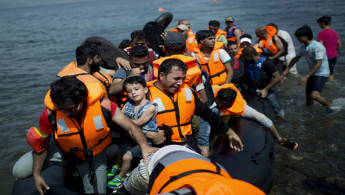Syrians risk all on their journey to Europe
He hadn't had any contact with his relatives, refugees travelling across Europe since a few days before the news broke.
After three days of panic, he finally received news his relatives had arrived safely in Germany.
Khaled rejected the idea of travelling on any of the hundreds of inflatable boats that leave the Turkish coast from Izmir, Bodrum and Marmaris toward Greece every day.
"I refused to travel on these dinghies," he told al-Araby al-Jadeed.
Instead, he decided to travel overland from Turkey to Greece and then onto Macedonia, Serbia, Hungary and finally the Netherlands, where he applied for asylum.
Thousands of people set out on perilous journeys across the sea or overland everyday, and a few lucky ones like Khaled make it to their destination. According to the UN refugee agency's Europe director, Vincent Cochetel, 124,000 refugees, mostly Syrians, have arrived in Greece since the start of this year, with 50,000 refugees arriving in July alone.
Greek documents
| Approximately 124,000 refugees, mostly Syrians, have arrived in Greece since the start of this year |
For Syrian refugees, arriving at one of the many Greek islands in the Mediterranean means a foothold in Europe.
Yasin is a Syrian refugee who recently arrived in Greece.
"Greek authorities grant refugees documents that permit them to travel feely within Greece for six months, which we use to travel into the other Balkan countries, because Greece is unable to provide refugees with any assistance," Yasin said.
The UN estimates that currently around 3,000 refugees and migrants cross from Greece into Macedonia every day on their way to northern Europe.
The UN refugee agency estimates that 80 percent of people waiting to cross into the Macedonian border town of Gevgelija are Syrians.
A refugee graveyard
Libya's close proximity to Europe has meant it is favoured by migrants and refugees fleeing conflict zones in Africa and the Middle East toward Italy and Malta, the southern routes to Europe.
However, refugees and migrants taking the Libyan route have to cross the dangerous waters of the Mediterranean in flimsy and overloaded boats, which has resulted in the deaths of thousands.
According to research by the International Migration Organisation (IMO), an estimated 2,342 people have drowned in the attempt to cross into Europe on the central Mediterranean route in the first six months of the year, making this year the deadliest on record for migrants and refugees lost at sea in the Mediterranean.
The Dublin Regulation
Hungary is an obstacle for refugees who successfully cross Greece, Macedonia and Serbia because of the Dublin Regulation - which requires European countries to process asylum seekers at their point of entry into the EU, blocking them from applying for asylum in other, perhaps more generous, EU countries.
| Loay, a Syrian refugee from Damascus was forced to give his fingerprints at a police station |
However, the large number of refugees crossing through Hungary has caused a crisis in the country, with more than 70,000 refugees crossing its borders so far this year compared with only 43,000 in all of last year.
Hungarian authorities are erecting a four-metre fence along its 175km border with Serbia, and employing violent tactics with refugees, chasing them with dogs and arresting those who refuse to be fingerprinted.
Louay, a refugee from Damascus, was forced into having his fingerprints taken at a police station, then released. He managed to make his way to Germany, where he lived in fear of deportation before Germany decided to allow Syrian refugees processed in other EU countries to remain.
"We were lucky," said Yasin, another Syrian refugee forced to give his fingerprints, along with his travelling companions.
"We were headed to Germany, which has started to turn a blind eye to the Dublin Regulation when it comes to Hungary, but new arrivals in Hungary now face the fence, the dogs and the rough treatment of Hungarian police."
Slavers of the 21st century
The route to Europe taken by a Syrian refugee depends on the amount of money he or she is willing to pay smugglers.
For example, crossing the Mediterranean via Libya to Italy costs around 3,000 euro ($3400), but it costs 3,500 euro ($4,000) to cross from Turkey to Europe via Greece.
Those who can afford it buy forged documents from Greek smuggling rings for around 5,000 euros and fly directly from Athens to the European country of their choice, after paying between 1,000 and 2,000 euros to be smuggled from Turkey to Greece.
Hassan, a Syrian refugee, described the smuggling networks that operate on the Libyan coast as "21st century slavers," after agreeing to pay a smuggler 2,000 euro to take him and his wife across the Mediterranean.
Hassan was shocked at the scene he witnessed when he arrived at the departure point in the Libyan town of Zuwarah, but could not back out or argue with the armed smugglers.
"They put us on a derelict wooden boat that was loaded with over 500 people," Hassan said.



